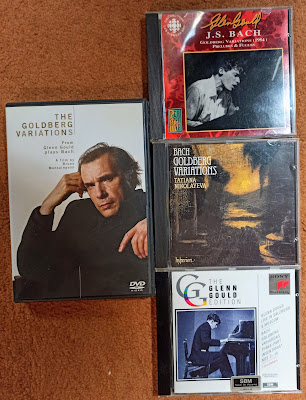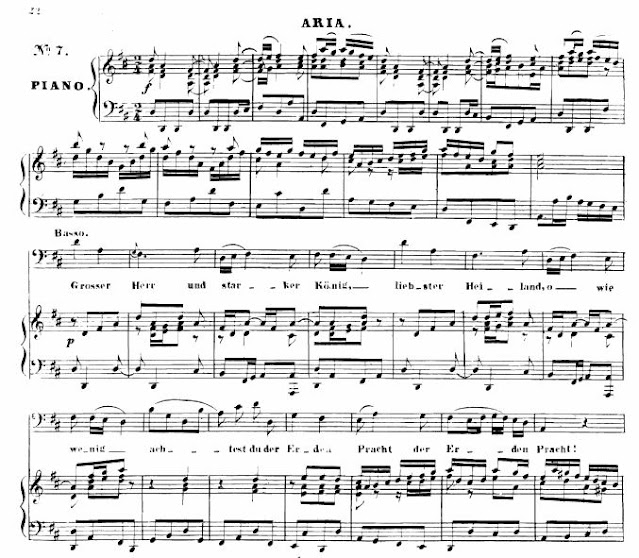The "Goldberg" Variations by J.S. Bach
As was certainly the case with many other people, my first exposure to Bach's "Goldberg" Variations came via a recording of Glenn Gould's iconic 1955 CBS recording. Gould's interpretation featured beautiful polyphonic playing with quick tempi and no repeats. The Aria and 32 variations fit easily on an LP and sold like hotcakes, making him an international star, whereas he had previously been more of an insider tip.
My first copy of the LP was purchased at the record store where I was working in 1985. If I had heard (of) the music before then, I can't recall. I thought Gould's playing was exciting and some of the variations pretty. Gould re-recorded the variations for CBS in 1981, shortly before his death at the age of 50. This recording stands out from most others on the market for being among the slowest. He had long retired from giving live performances, opting for the recording studio to preserve his status as a major figure in the world of music. He also gave lectures on CBC-TV and published essays about everything from music to "The Idea of North" which, he said, was in every Canadian's mind.
It is difficult even today to separate the name Gould from the Goldberg Variations - just go ahead and call them the Gouldberg Variations! His 1959 live recording from Salzburg (available on Sony Classics) is electrifying as well. Bruno Monsaingeon, who directed so many moving and informative documentary films of the lives of great musicians, focused his portrait of Gould on the Variations.
And yet there are other great interpretations of this magnificent piece of music. I first heard it live at the Musikhochschule in Freiburg, played by Claudio Martinez Mehner, a student of (my English student!), Vitaly Margulis. That athletic performance was in stark contrast to the last live performance I heard, by Maruschka Christiane Hasselmeier, in cooperation with Barbara Stoll. They did a poetry reading and musical performance about night pieces. What many people forget is that Bach wrote the variations originally for a count who had difficulties sleeping. Here is an historic account:
Dieses Modell, nach welchem alle Variationen gemacht werden sollten, obgleich aus begreiflichen Ursachen noch keine einzige darnach gemacht worden ist, haben wir der Veranlassung des ehemaligen Russischen Gesandten am Chursächs. Hofe, des Grafen Kaiserling zu danken, welcher sich oft in Leipzig aufhielt, und den schon genannten Goldberg mit dahin brachte, um ihn von Bach in der Musik unterrichten zu lassen. Der Graf kränkelte viel und hatte dann schlaflose Nächte. Goldberg, der bey ihm im Hause wohnte, mußte in solchen Zeiten in einem Nebenzimmer die Nacht zubringen, um ihm während der Schlaflosigkeit etwas vorzuspielen. Einst äußerte der Graf gegen Bach, daß er gern einige Clavierstücke für seinen Goldberg haben möchte, die so sanften und etwas muntern Charakters wären, daß er dadurch in seinen schlaflosen Nächten ein wenig aufgeheitert werden könnte. Bach glaubte, diesen Wunsch am besten durch Variationen erfüllen zu können, die er bisher, der stets gleichen Grundharmonie wegen, für eine undankbare Arbeit gehalten hatte. Aber so wie um diese Zeit alle seine Werke schon Kunstmuster waren, so wurden auch diese Variationen unter seiner Hand dazu. Auch hat er nur ein einziges Muster dieser Art geliefert. Der Graf nannte sie hernach nur seine Variationen. Er konnte sich nicht satt daran hören, und lange Zeit hindurch hieß es nun, wenn schlaflose Nächte kamen: Lieber Goldberg, spiele mir doch eine von meinen Variationen. Bach ist vielleicht nie für eine seiner Arbeiten so belohnt worden, wie für diese. Der Graf machte ihm ein Geschenk mit einem goldenen Becher, welcher mit 100 Louisd'or angefüllt war. Allein ihr Kunstwerth ist dennoch, wenn das Geschenk auch tausend Mahl größer gewesen wäre, damit noch nicht bezahlt. Noch muß bemerkt werden, daß in der gestochenen Ausgabe dieser Variationen einige bedeutende Fehler befindlich sind, die der Verf. in seinem Exemplar sorgfältig verbessert hat. [Source]
Tatiana Nikolayeva was an excellent interpreter of Bach's music. In 1950 at Leipzig's International Bach Competition, she played The Well-tempered Clavier well enough to win the first prize and, more importantly, the life-long friendship of one of the jury members: Dmitri Shostakovich. Soon afterwards, he composed his monumental Op. 87 for her - 24 Preludes and Fugues - about which you can also read on my blog. She made at least three recordings of the Goldberg Variations. I may have heard all of them over the years, but particularly enjoy the recording on the Hyperion label.
But the interpreter whom I choose to listen to now is Andras Schiff. Admittedly, it has taken me some time to appreciate both Bach's music and Schiff's musicianship. I first heard him in Munich with, I believe, and all Bach program in 1990. Perhaps my seat in the back of the Herkulessaal didn't allow me to fully enjoy his interpretation, but it would be another 13 years before I discovered his first recording of the Goldberg Variations. It was the right time, I guess. I listened to them every day on my way to work. There is something elegant, unpretentious, thoughtful and balanced about his interpretation that suits my taste. His live recording here from the Proms has been manipulated to have a lower pitch, supposedly to match Bach's original intention...if Johann Sebastian had had a Steinway "D" grand to play on!
A few years I also began my personal study of the piece. Sticking to the Aria and first Variation, I realized how much music Bach suffused into his pieces. There is quite a difference between practicing Bach, Beethoven, Schubert, Chopin, Brahms, Mahler, Debussy or Scriabin! Some pieces leave me relaxed, others riled up and spent. Isn't it great to have so much music to choose from?!




Comments
Post a Comment